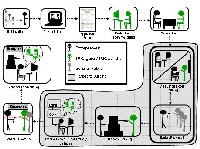| ICT Enabled Enterprise Development Services Aditi Pany & Pravin Mallick apany@tarahaat.com In keeping with its mandate to empower rural and marginalized communities through ICT with the purpose of enabling them to integrate with the mainstream economy, TARAhaat’s latest venture - ICT enabled Enterprise Development Services- is an exciting step forward. It focuses on providing entrepreneurship opportunities to youth, women, self-help groups, landless and small land holders through the rapidly expanding network of TARAkendras, TARAhaat’s rural business-cum-community centres. When ready, the Enterprise Development Services (EDS) will add a critical dimension to the scope of services provided by TARAhaat, or indeed any experiment in Information and Communication Technology (ICT) enabled services for rural India! What’s this new venture all about? The EDS is an innovative experiment in addressing a critical need in rural India – employment. Micro and mini enterprises could be a driving force for the rural economy, seen as the key to addressing the 15 million new jobs needed every year in India. Small and local enterprises together account for the largest number of jobs in the country and have shown the positive impact that they can have on individuals and communities. The service is also in line with the Government of India’s focus on rural enterprises and addresses the broader objective of the Eighth Millennium Development Goal that calls for cooperation with the private sector to address youth unemployment and make available all the benefits of new technologies. The EDS will be a comprehensive package comprising an Enterprise Package for technical training and market and financial linkages, an Entrepreneurship Development Programme for understanding business setup, planning and management, an Ask the Expert service for on-going technical and business support and an exhaustive FAQ database of best practices and solutions. As an integral part of the venture, an Outreach Programme for identifying and attracting potential entrepreneurs is also in the design. The challenge before us is to develop each of these components and integrate them effectively on an ICT platform to meet our broad objectives:
How is TARAhaat’s EDS Unique? There have been some initiatives by both the Government of India and NGOs in the area of rural entrepreneurship, but they have all had their limitations. Most existing programmes are constrained by a narrow focus on one or few of the many elements necessary for the creation of successful enterprises, either focusing singularly on linkages with the bank, government entitlement schemes or on providing limited market access. A lot of the programmes also suffer from the lack of meaningful and viable enterprise options and are particularly averse to technology enterprises. Most importantly, the need for capacity building support throughout an enterprises’ life cycle is a facility that is largely non-existent. TARAhaat’s ICT based EDS attempts to address all these limitations in a unique fashion. To begin with, the EDS will be an exhaustive package designed to support entrepreneurs through every stage of the business life cycle. The service will also harness the DA group’s experience of over 20 years in technology innovation, testing and implementation in the areas of shelter, energy, biomass, water and cottage industries. In addition, the content and delivery will be customized to the various regional languages and other local needs, keeping the end user in mind.
An important outcome of the EDS would be the framework, engines and tool kit for delivery, as a base for future enterprise packages that can be rolled out, in an economically sustainable and scalable manner, and much faster through different networks. While the focus is on women, SHGs, unemployed youth, landless and small land holders, the experience from this project and the enterprise packages can be adapted to meet the needs of other audiences as well as contextualised to other geographies. The methodology and software developed can also be applied to develop numerous other enterprise packages resulting in a multiplier effect on the number of rural enterprises created. Will ICT Work? For India’s tremendous employment needs, a sustainable model that can be scaled to a macro level and replicated nation-wide is imperative. ICT has the potential to overcome some of the possible challenges this poses as it substantially enhances the delivery of services at much lower cost than current resource intensive solutions. It provides the key to developing holistic engines that deliver complete solutions to potential entrepreneurs located in the large, diverse and highly dispersed geographical canvas that is rural India, cost effectively. To sum up, ICT forms the backbone of the EDS process flow (illustrated in the figure given at the bottom) as it delivers the following benefits:
Sporadic initiatives across the country have shown the potential of ICT as an effective tool. Our own efforts at TARAhaat have been very encouraging and give us the confidence to go forward with this ambitious plan with ground-breaking potential.q | ||||||||||||||||||||||||||||||||||||||||||||
